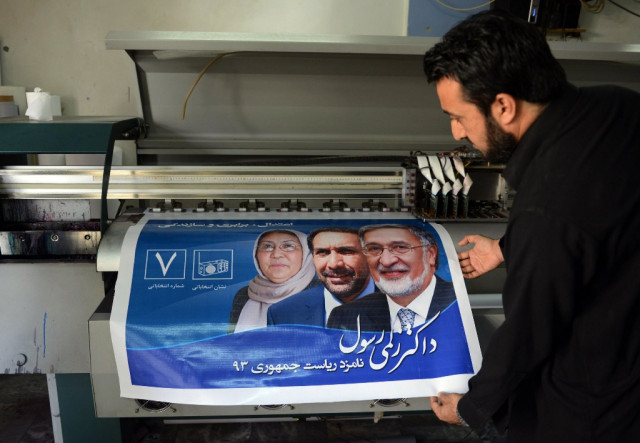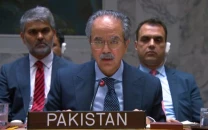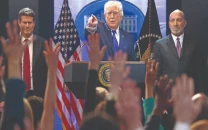Pakistan keeps close eye on vote in its Afghan backyard
Pakistan does not have an obvious ally among the three leading candidates.

Pakistani employee printing electoral posters of an Afghan presidential candidate Zalmai Rassoul at a printing press in Peshawar. PHOTO: AFP
Helped by cheaper labour and a favourable exchange rate, printers in Peshawar, less than 60 kilometres from the border, have been busy making Afghan election banners.
"We have been swamped with work for the past two weeks because of the Afghan elections. One candidate has asked me to print 200,000 posters," said printer Mohammad Sajid.
Business links with Afghanistan have grown in recent years and analysts say Pakistan wants a stable northwestern neighbour, shifting from the interference of the past.
Fear of encirclement by arch-rival India led generations of Pakistani military thinkers to view Afghanistan as a zone of potential risk - and thus legitimate space for covert intervention.
Afghan officials still regularly accuse Pakistan of colluding with militants, most recently over an assault on a luxury Kabul hotel that left nine people dead.
Pakistan vigorously denies the claims and Prime Minister Nawaz Sharif has worked hard to improve ties with President Hamid Karzai, who is stepping down after serving the maximum two terms in office.
"I think this change started in the previous government and Pakistan sticks to the policy because probably they have realised this 'one favourite' policy has been a disaster," author and defence analyst Imtiaz Gul of Islamabad's Centre for Research and Security Studies told AFP.
During the last Afghan presidential election, some Pakistani officials were more favourably disposed towards incumbent Karzai, who shared a good rapport with his then-Pakistani counterpart Asif Ali Zardari.
This time, however, Islamabad has been careful not to side with any candidate in Afghanistan's first ever democratic transition of power.
Pakistan may be reluctant to antagonise whoever might emerge victorious by backing an opponent, but as Gul noted, it also does not have an obvious ally among the three leading candidates.
Zalmai Rassoul is seen as the preferred choice of Karzai, with whom Islamabad's relations are at a low ebb. Former minister Abdullah Abdullah draws support from the Tajik ethnic group, who have not favoured Pakistan, and economist Ashraf Ghani has "no connection" with Islamabad, Gul said.
Though it may not have a candidate of choice, Pakistan remains a significant player in the election because its border areas serve as a rear base for the Taliban, who have vowed to disrupt the ballot and already claimed a series of attacks.
"They (the Pakistani government) want peace and stability on the Afghan border because it has a direct impact on peace and security in Pakistan," said Saifullah Khan Mehsud, an expert on Pakistan's restive tribal border regions at the FATA Research Centre.
Pakistan also fears a new wave of Afghan refugees, who currently number some 1.6 million having fled in the aftermath of the withdrawal of Soviet forces in 1989.
While the refugees were able to vote in 2004, no arrangements have been made this time around.
"We're frustrated, we'd like to have a say about the future of our country," said Haji Jumaa Gul, an elderly man at a refugee camp in Peshawar, who says the situation at home is still too volatile to return.



















COMMENTS
Comments are moderated and generally will be posted if they are on-topic and not abusive.
For more information, please see our Comments FAQ